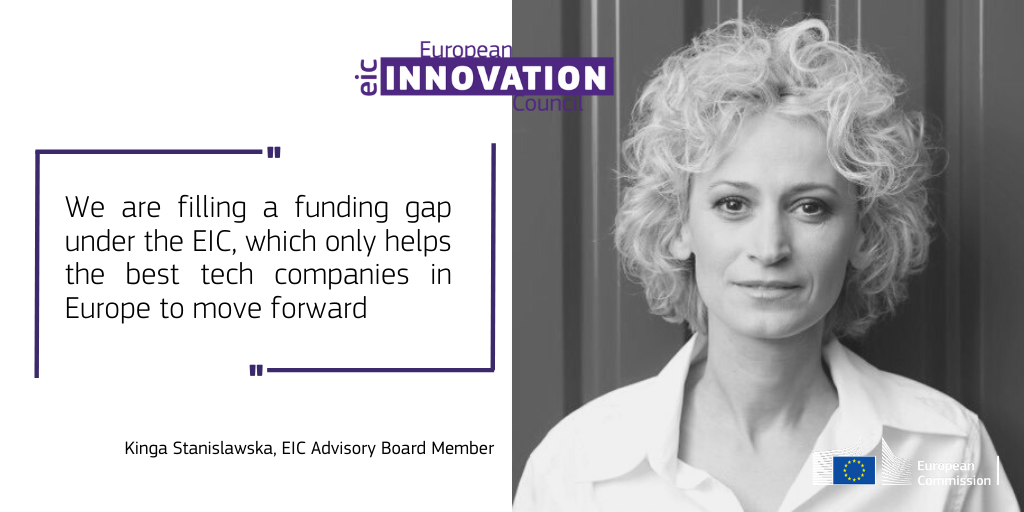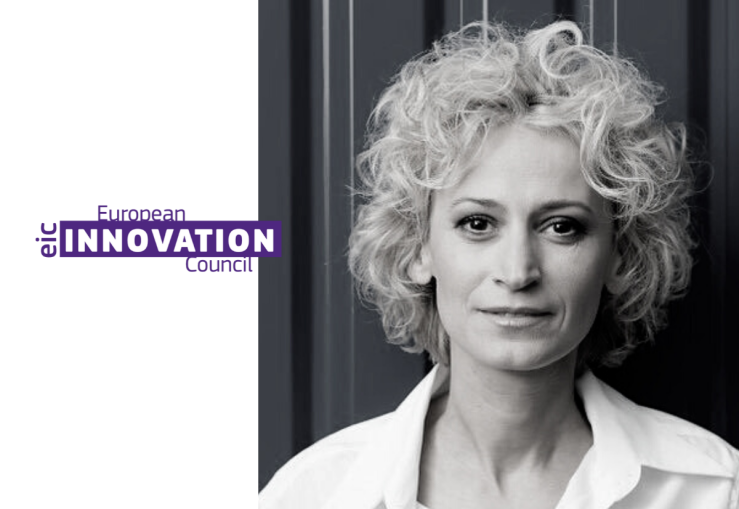On 16 June 2020, the European Innovation Council organised an ePitching session with Investors on SaaS and ICT. After the event, Kinga Stanislawska, member of the EIC Advisory Board and herself a venture capital investor, talked more about the future of SaaS and ICT sector, commented the novelties introduced in the EIC programme and shared her views on the existing gender investment gap in Europe. Kinga is active in supporting women-led companies. The VC investor is a mentor in Vital Voices and Foundation for Women Entrepreneurship and also co-founded the ‘European Women in VC’ community of over 400 women in the European and Israeli VC space.
You opened your speech at the EIC ePitching in SaaS and ICT with your views on the future of innovation and investment in Europe. Could you expand on these views?
This sector is super important for the growth of Europe. No matter which area we look at, there’s an element of data that needs to be gathered, analysed and a need for Machine Learning or AI to help make better decisions. And this is something that happens right across all sectors. We are talking about healthcare, energy efficiency, many different sectors. The old-school economies and the traditional industries are all digitalising.
With the latest problems we had around COVID-19, the technology sector and in particular enterprise software were the only segments of the market where companies didn’t lose their share prices, and actually, some of them have grown exponentially like Zoom or Slack. The SaaS market is gaining more momentum, and therefore, we should make sure that Europe will lead this sector.
You gave your speech in your capacity as EIC Advisory Board Member. Could you explain how this opportunity came along?
This EIC Advisory Board was created last summer, 22 Europeans were selected for this board, coming from very diverse backgrounds. However, there’s one goal that brings everyone together. It’s the belief that Europe is back, that Europe can move forward in supporting entrepreneurship, technology and in financing the most disruptive and innovative companies. This is the goal of the EIC Advisory Board. We want to support the most innovative and disruptive founders and their ideas to help them grow with enough capital.
The great thing also around the focus of the EIC is the positive impact for the socio-economic environment. We are supporting ideas that can make the European Green Deal move forward, which are for the common good of the European Member States. Another focus is healthcare, where we see a boom in digital health, in new types of solutions to fight concrete diseases, or on customising processes in the healthcare system. Whatever we are financing or investing in, it needs to have a positive impact.

What are your views on the investment activities organised by EIC, such as this ePitching event?
The key feature of the EIC up until now, and for the future, is that it’s not only about the financial support. It’s also the smart element that the EIC can deliver, putting together all the clever minds and networks of European Tech leaders. It’s also about the Business Acceleration Services, about having access to partners, investors, corporates, to the ecosystem. The EIC has been already doing this very successfully. When we look at the statistics today, we have over 4 billion of euros in new investments going into the EIC portfolio, so clearly, this relationship with new investors is something at the forefront of the EIC mission. Now we want to make it an even bigger success. We want very much to push forward on the idea of knowledge sharing with many different platforms because we believe that founders, VCs and corporates, as well as the European Commission, are all part of one single ecosystem. We are all working for the common good of these companies in Europe, making them more successful.
How do you find the option of the EIC directly investing in companies in the form of convertible notes and/or equity?
In the EIC Accelerator, the first equity instrument was introduced last year, where the companies applying for the grant, could also apply for blended finance. This was a huge step forward because this is the kind of capital that doesn’t need to generate a return in a very fast and concise period. The Venture Capital sector is driven by return in time. However, the EIC is a type of fund that can be timeless and, as a result, there is no time pressure on delivering a particular outcome. But this doesn’t mean that we don’t have them. We will support the delivery of those results as fast as possible. However, in R&D, it’s not possible to speed some things up and, with this kind of innovations, we need more time.
Last year you attended the EIC exclusive event “Empowering Women Innovators”. Could you briefly explain your views on the existing gender investment gap and what you see are the possible actions of overcoming it? How can the EIC contribute to this?
Unfortunately, the statistics across Europe in terms of financing female founders are very low. And here I mean female founders at the level of startups and also females that are managing Venture Capital Funds. There’s not much to be proud of, and we are not making progress over the years. I believe there was a study that was carried out at the end of 2017, announcing that just over 2% of the venture capital money in Europe went to female-founded start-ups. In terms of women fund managers in venture capital, only around 5% of funds across Europe has a woman who is involved in the final decision making of the investment. So, there’s a huge opportunity to grow. First of all, statistics show that diverse companies and mix funds perform better and, secondly, in terms of consumer products, women usually make around 50% to 70% of consumer decisions, which means that solutions targeting the decision-makers are actually a huge opportunity for an investment.
I think it’s still early to say in concrete examples how this will work, but there was a successful call for female founders in the EIC early this year. We will create specific programmes, and we will share more information on how female founders can participate in the EIC and hopefully, this will also impact the number of female leading Venture Capital Funds across Europe. I think this will be something for the common good and it will create a good impact on society.
On a closing note, what does the future hold for the EIC?
The different EIC Accelerator calls since autumn have shown significant interest from European startups, in particular in the blended finance option. So, the need it is really there. Europe is still behind in terms of investment into start-ups, and we are filling a funding gap under the EIC, which only helps the best tech companies in Europe to move forward faster and create real value. The role of the EIC is important in creating the future of technology, in supporting disruptive innovation and in making sure that Europe is really at the forefront of the technological change and on the latest innovation trends that are out there.

DISCLAIMER: This information is provided in the interest of knowledge sharing and should not be interpreted as the official view of the European Commission, or any other organisation.

